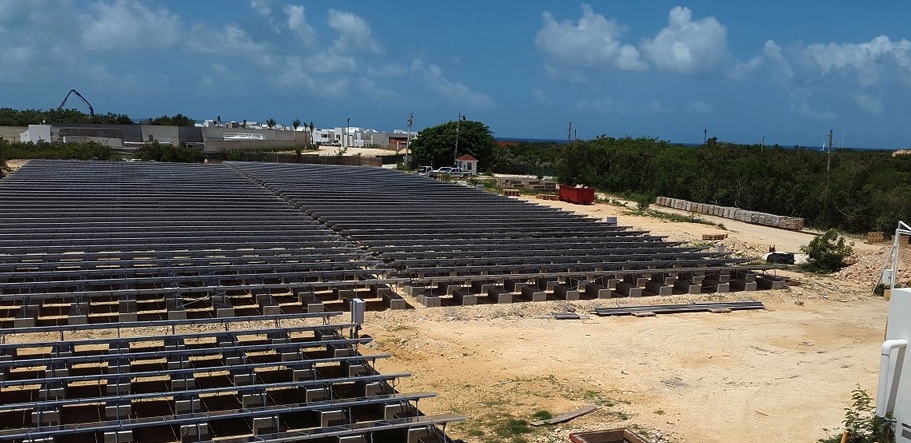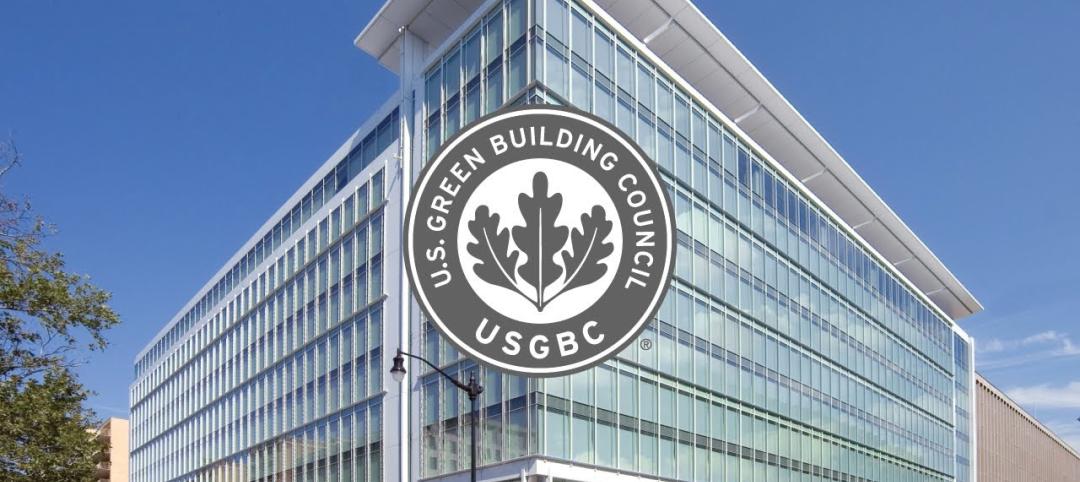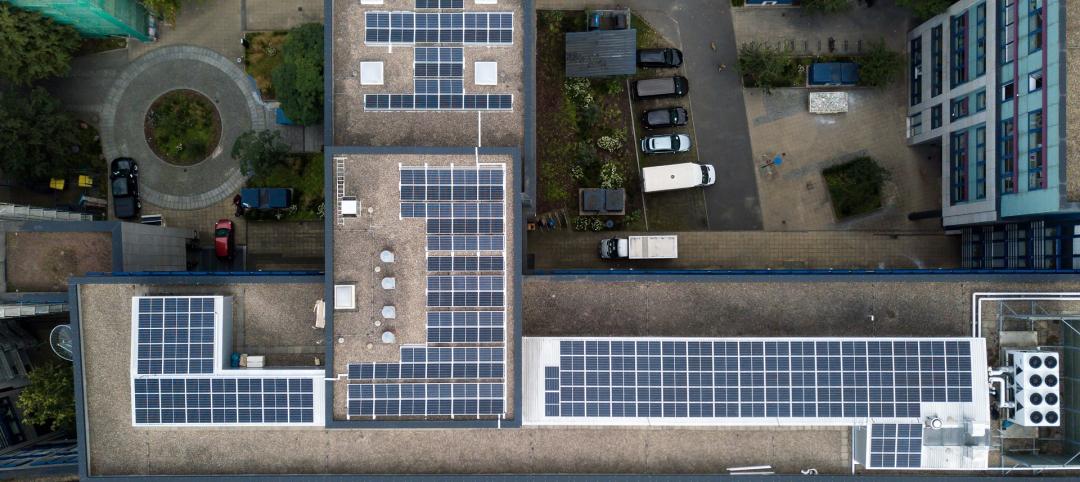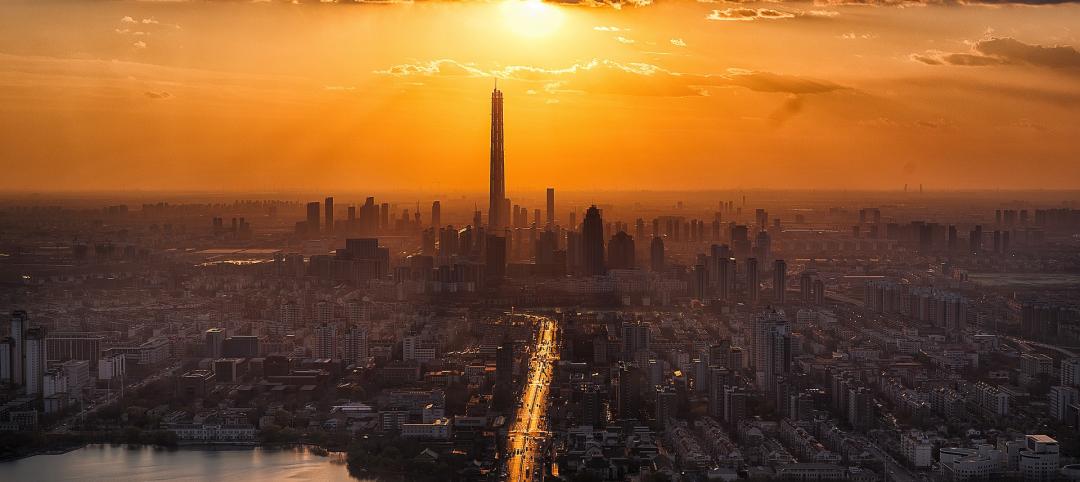Strapped with both water and energy crises, several island nations are investing in solar-powered water plants to attain more resilient water and power sources, according to executives of a major international resort chain.
One of the latest examples is the CuisinArt Golf Resort & Spa’s new installation in Anguilla, an island in the British West Indies east of Puerto Rico. The innovative solar generation system powers the resort’s reverse-osmosis water plant, and it is seen as a model for similarly situated Caribbean islands and hospitality operators.
Working with GE and Inovateus Solar, a South Bend, Ind.-based photovoltaic system developer, CuisinArt, installed its own 1.0-MW solar power generation plant with a battery backup system to store energy. In this way, says Rory Purcell, the resort’s chief engineer, the off-grid plant will provide an uninterruptible energy supply for the reverse-osmosis (RO) water treatment system.
The RO plant filters and desalinates supply water, creating potable “solar water” to the residents on the island, guests of the resort and irrigation water for the golf course, says Purcell.
The project—designed and constructed by CuisinArt and Inovateus with the contractors SwitchLogix and PDE Total Energy Solutions—has been designed in such a way that it is completely isolated from the grid. It also has the unique benefit of being able to reconnect partial loads, in a discretionary way, to continue to desalinate outside solar production hours. For those hours when the sun is down, it depends on the local utility, Anguilla Electricity Company Ltd.
Anguilla recently joined the group Carbon War Room’s Ten-Island Challenge to reduce the Caribbean’s carbon footprint, and the CuisinArt plant is the first major foray into renewables for the island. The new solar plant saves 1.2 million pounds of carbon dioxide emissions annually, says Inovateus executive Peter Rienks. “The payback on this project will immediately save CuisinArt hundreds of thousands of dollars per year. Even more important, it provides a solution to the global water crisis,” he explains. “This system could be duplicated on any island in any country around the world.”
According to CuisinArt’s Purcell, the initiative is both viable and secure. “It is a proven strategy to penetrate the national demand with renewable energy far in excess of the usual grid-tied limits,” he says. PV is a low “environmental impact source, designed to withstand Category 5 hurricanes, low-flying objects and poorly directed golf balls,” he chuckles. “It has low maintenance requirements with a life expectancy in excess of 25 years.”
The new solar array supports the plant’s daily capacity of 1.25 million gallons of fresh water, which serves the 130-key resort and its Greg Norman Signature Golf Course, as well as the new 80-key Reef Hotel, an associated spa and six full-service restaurants. CuisinArt also operates hydroponic and organic farms, a 500,000-square-foot residential estate, and -- of course -- an extensive irrigation system.
“CuisinArt has set a sustainable precedent for photovoltaic water purification throughout the world,” says Peter Foss an executive with GE. “Not only will the project have a great return on investment, it will also help reduce the island’s dependence on fossil fuels and help create a cleaner environment for generations to come.”
Related Stories
Office Buildings | Dec 6, 2022
‘Chicago’s healthiest office tower’ achieves LEED Gold, WELL Platinum, and WiredScore Platinum
Goettsch Partners (GP) recently completed 320 South Canal, billed as “Chicago’s healthiest office tower,” according to the architecture firm. Located across the street from Chicago Union Station and close to major expressways, the 51-story tower totals 1,740,000 sf. It includes a conference center, fitness center, restaurant, to-go market, branch bank, and a cocktail lounge in an adjacent structure, as well as parking for 324 cars/electric vehicles and 114 bicycles.
Energy Efficiency | Dec 6, 2022
Washington state’s Building Code Council mandates heat pumps in all new residential construction
The Washington State Building Code Council has voted to require heat pumps for all new residential construction starting in July 2023. The new mandate has drawn criticism over concerns that it will add costs to housing construction, especially given current supply chain challenges for heat pumps.
Geothermal Technology | Dec 6, 2022
Google spinoff uses pay-as-you-go business model to spur growth in geothermal systems
Dandelion Energy is turning to a pay-as-you-go plan similar to rooftop solar panel leasing to help property owners afford geothermal heat pump systems.
K-12 Schools | Nov 30, 2022
School districts are prioritizing federal funds for air filtration, HVAC upgrades
U.S. school districts are widely planning to use funds from last year’s American Rescue Plan (ARP) to upgrade or improve air filtration and heating/cooling systems, according to a report from the Center for Green Schools at the U.S. Green Building Council. The report, “School Facilities Funding in the Pandemic,” says air filtration and HVAC upgrades are the top facility improvement choice for the 5,004 school districts included in the analysis.
Legislation | Nov 23, 2022
7 ways the Inflation Reduction Act will impact the building sector
HOK’s Anica Landreneau and Stephanie Miller and Smart Surfaces Coalition’s Greg Kats reveal multiple ways the IRA will benefit the built environment.
Green | Nov 13, 2022
USGBC updates LEED v4 to better address greenhouse gas emissions and climate change
The U.S. Green Building Council (USGBC) will update the LEED v4 green building certification program to “more directly address greenhouse gas emissions and climate change” according to a USGBC news release.
Green | Nov 13, 2022
NREL report: Using photovoltaic modules with longer lifetimes is a better option than recycling
A new report from the U.S. National Renewable Energy Laboratory (NREL) says PV module lifetime extensions should be prioritized over closed-loop recycling to reduce demand for new materials.
Green | Nov 13, 2022
Global building emissions reached record levels in 2021
Carbon-dioxide emissions from building construction and operations hit an all-time high in 2021, according to the most recent data compiled by the Global Alliance for Buildings and Construction.
University Buildings | Nov 13, 2022
University of Washington opens mass timber business school building
Founders Hall at the University of Washington Foster School of Business, the first mass timber building at Seattle campus of Univ. of Washington, was recently completed. The 84,800-sf building creates a new hub for community, entrepreneurship, and innovation, according the project’s design architect LMN Architects.
Industry Research | Nov 8, 2022
U.S. metros take the lead in decarbonizing their built environments
A new JLL report evaluates the goals and actions of 18 cities.

















